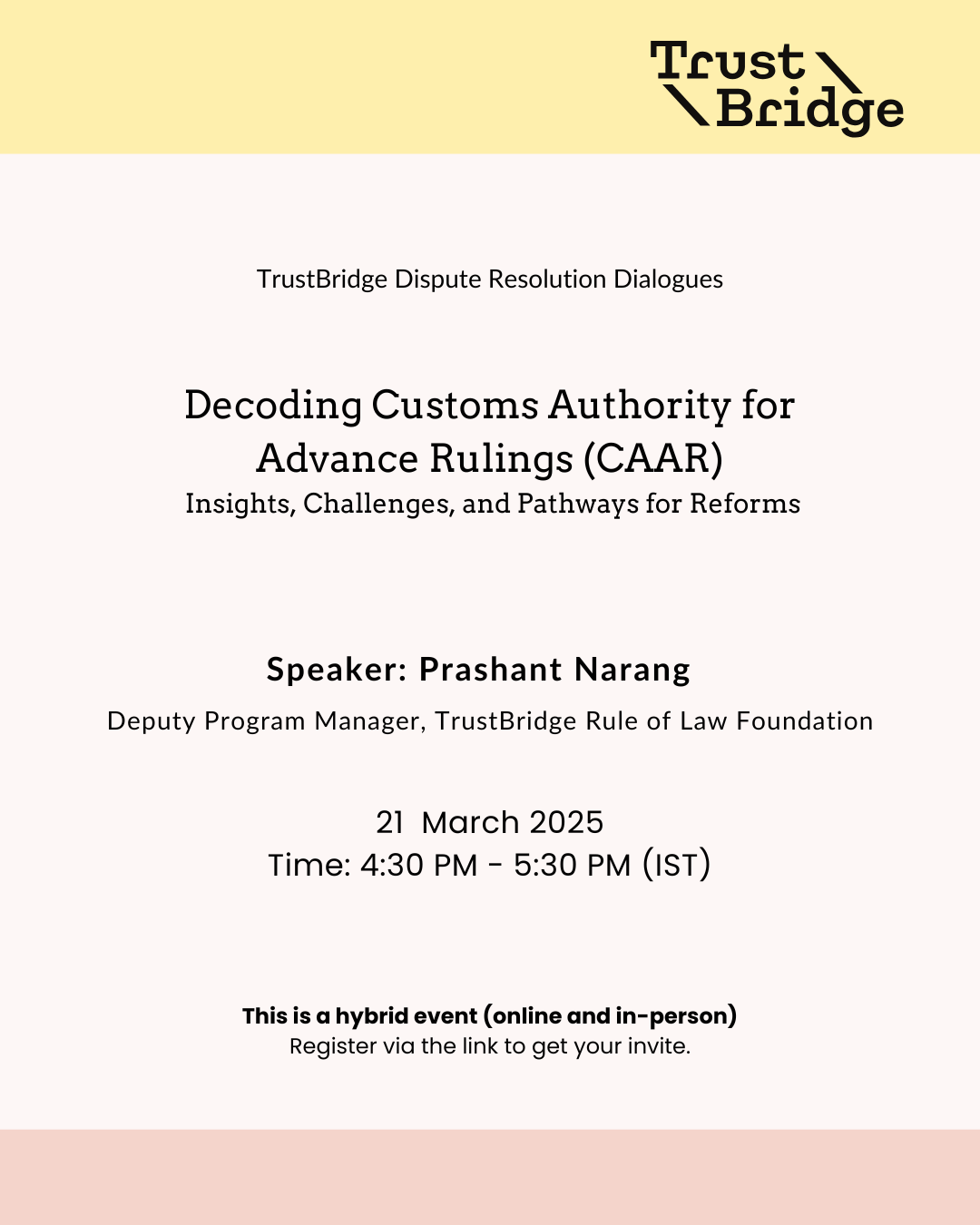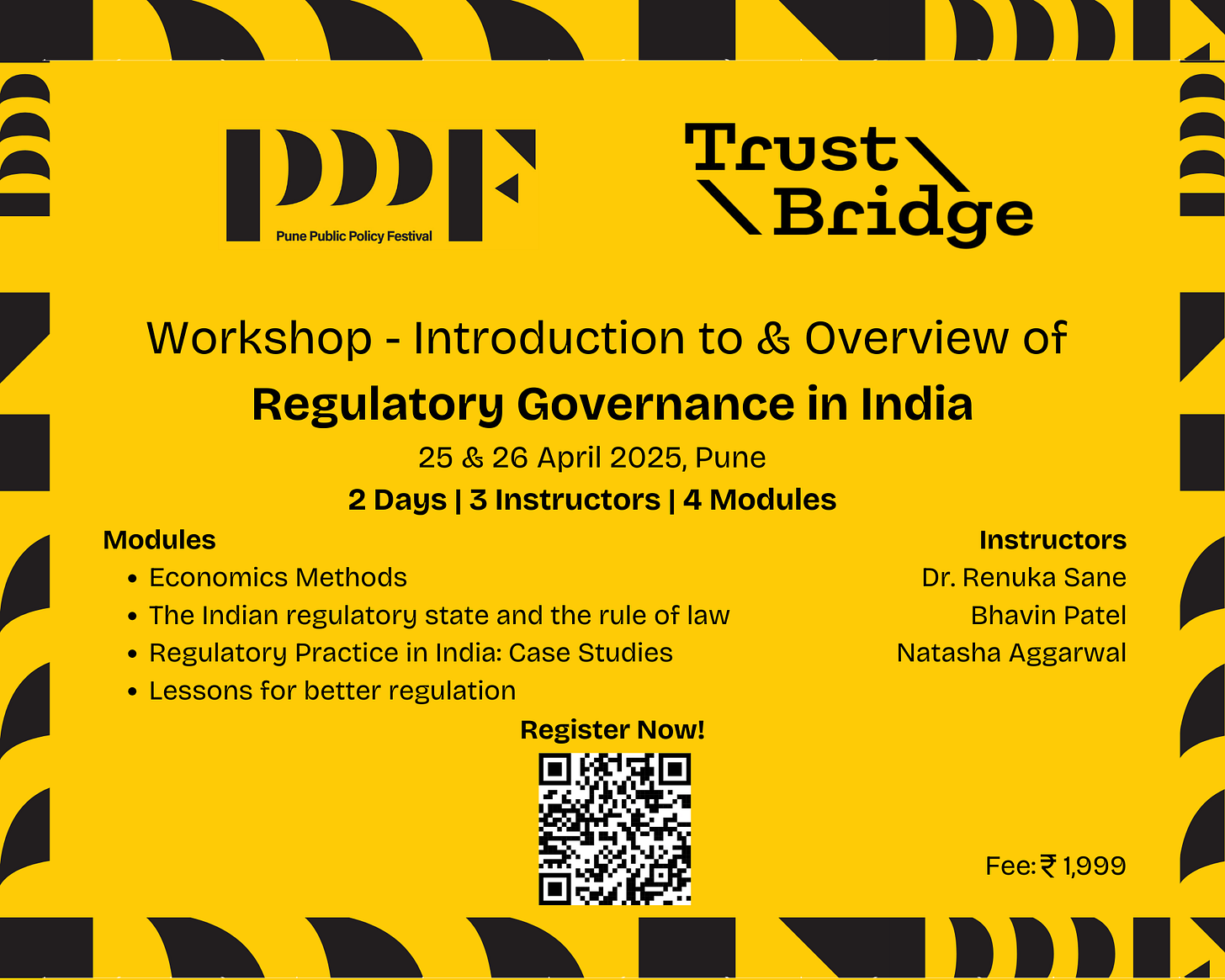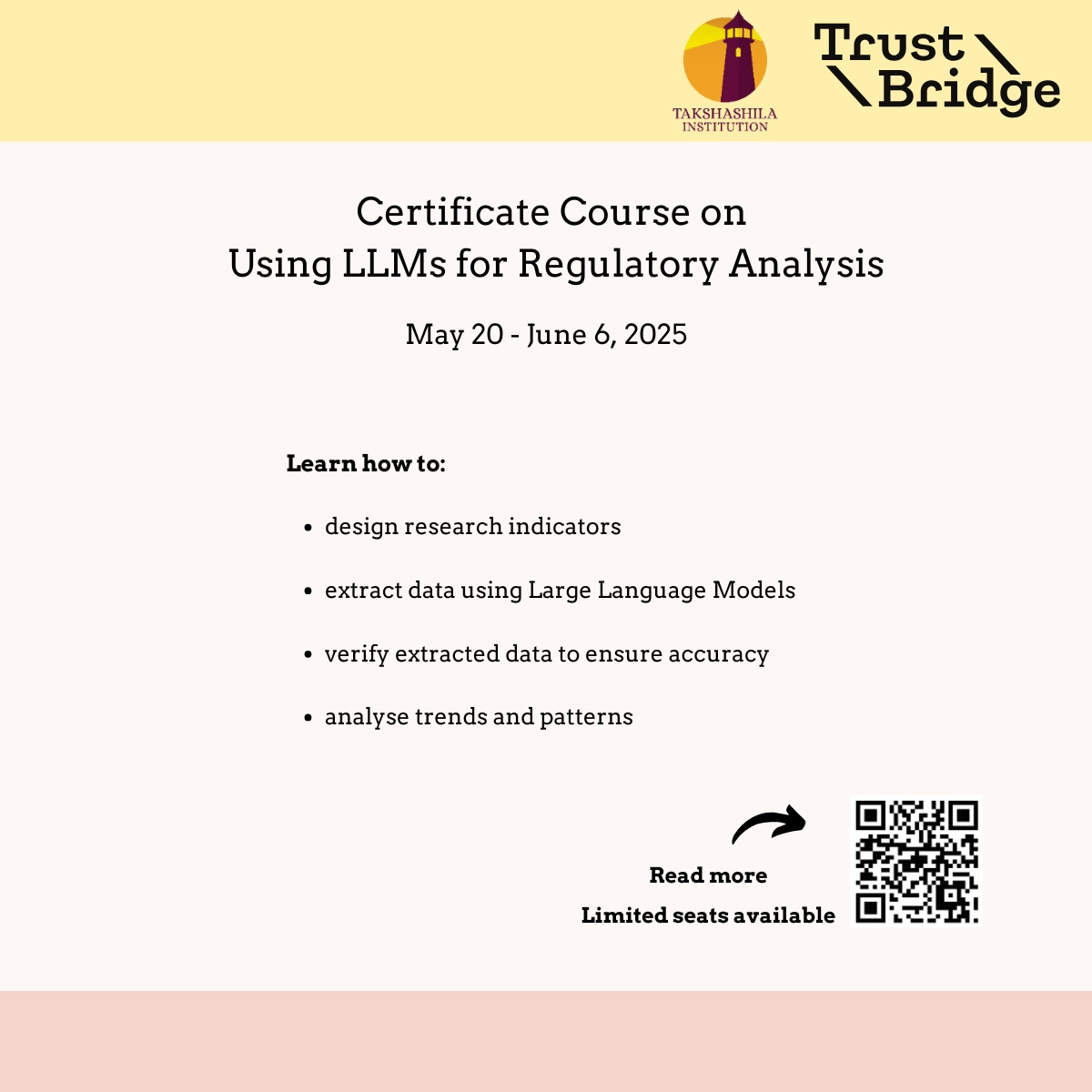Good order writing, regulatory governance, OpenTakshashila course, decoding CAAR, arbitration, pumped storage plants, Tareekh Pe Justice | The TrustBridge Newsletter | Issue 19
Good order writing | Regulatory governance | OpenTakshashila course | Decoding CAAR | Arbitration | Pumped storage plants | Tareekh Pe Justice
This is TrustBridge’s monthly newsletter. TrustBridge seeks to improve India’s business environment by improving the rule of law. In this monthly newsletter, we bring you the work done by the TrustBridge Team in the public space and offer insights into future work.
Upcoming Events
Prashant Narang will present his co-authored paper on ‘Decoding CAAR: Insights, Challenges, and Pathways for Reforms’ as part of TrustBridge’s Dispute Resolution Dialogues on March 21, 2025. Register here.
Past Events
Harsh Manohar delivered a talk titled ‘Legislating for a Pro-Arbitration India: Opportunities and Obstacles’ as part of TrustBridge’s Dispute Resolution Dialogues on February 21, 2025.
Renuka Sane and Bhavin Patel presented a paper entitled ‘Balancing Power and Accountability: An Evaluation of SEBI’s Adjudication of Insider Trading’ at the NLS Faculty Seminar on March 5, 2025.
Trainings
Renuka Sane, Bhavin Patel and Natasha Aggarwal will deliver:
A course titled ‘Law and Regulation Domain’ at the Indian School of Public Policy from April 3 - 17, 2025.
A workshop titled ‘Introduction to, and Overview of, Regulatory Governance in India at the Pune Public Policy Festival on April 25 - 26, 2025. Read more and register for the workshop here.
Bhavin Patel and Natasha Aggarwal will deliver a three-week online course titled ‘Using LLMs for Regulatory Analysis’ on OpenTakshashila from May 20 - June 6, 2025. Read more and register for the course here.
Podcast
Akshay Jaitly discussed the challenges and future pathways in the energy sector with Shruti Rajagopalan on an episode of Ideas for India, a podcast by Mercatus Center at George Mason University, on March 13, 2025.
Book
Chitrakshi Jain and Prashant Reddy T. published a book titled ‘Tareekh Pe Justice: Reforms for India's District Courts’ on March 13, 2025.
One of the biggest failures of the Indian state since it gave itself a new Constitution in 1950 has been its inability to deliver fair and timely justice to its citizens. Tareekh Pe Justice: Reforms for India’s District Courts conducts a deep dive into the dysfunction plaguing the district judiciary. These courts are the only layer of the judiciary that operate in every district of the country. Of the three tiers of the Indian justice system, the district courts hear the largest number of cases and are the first point of contact for most Indians seeking justice.
Articles
Vijay Singh Chauhan, Prashant Narang and Monika Yadav published a new working paper titled ‘Decoding CAAR: Insights, Challenges, and Pathways for Reforms’ on March 5, 2025.
This study critically evaluates Customs Authority for Advance Rulings (CAAR) in meeting its statutory mandates, particularly its adherence to the 90-day timeline for issuing rulings, the binding nature of its decisions, and its operational efficiency. Employing a mixed-methods approach, the research integrates qualitative insights from stakeholder interviews with quantitative analysis of advance rulings issued between January 2021 and August 2024. The findings provide a foundation for reform to ensure CAAR's long-term relevance and effectiveness.
A summary can be accessed here on the Leap Blog.
Karan Singh, Bhavin Patel and Natasha Aggarwal published a new working paper titled ‘A guide to writing good regulatory orders’ on March 10, 2025.
Regulatory agencies in India, vested with quasi-judicial powers, play a pivotal role in economic governance. Their orders significantly impact market participants and public trust. However, deficiencies in reasoning, structure, and clarity in these orders often undermine regulatory legitimacy and efficiency, leading to increased appeals and diminished stakeholder confidence. Drawing on a survey of extant literature and an analysis of orders issued by the Securities and Exchange Board of India (SEBI) and State Electricity Regulatory Commissions (SERCs), we identify four sets of requirements for better order writing: informational, structural, substantive, and stylistic. We propose a method of structuring regulatory orders that would aid readability and strengthen the logical flow of arguments. We propose measures such as the use of plain language and logical organisation to enhance the accessibility and transparency of regulatory orders. We study two sample orders to understand the current state of regulatory order writing practices in India. The study reveals significant gaps in current practices. We make some recommendations, including legislative reforms, organisational changes, and leveraging technology such as Large Language Models, to improve the quality of regulatory order writing.
A summary can be accessed here on the Leap Blog.
Upasa Borah, Chitrakshi Jain and Renuka Sane published a new working paper titled ‘Pumped Storage Plants in India: Assessing Policies and Progress ’ on March 11, 2025.
The paper presents the evolution of policy on pumped storage plants (PSPs) and their performance in India. It builds a dataset of PSP projects from the information published by the Central Electricity Authority (CEA) and the CapEx dataset maintained by the Centre for Monitoring Indian Economy (CMIE). Participation of the private sector in the development of PSPs has increased considerably since 2018. Out of the 130 GW capacity that is under stages of planning, 102 GW is being developed by the private sector. However, the ratio of projects which receive concurrence and are eventually completed remains low. Of the 91 projects in the dataset, 17 are under implementation and six have been completed. The completed projects account for 3.3 GW of storage capacity. The low ratio of PSPs that are completed, combined with the experience of delay in executing hydropower projects, implies that the requirements of storage capacity addition from PSPs by 2026-27 and 2031-32 will be met only if the capacity under planning is realised and the projects are completed within six years.
A summary can be accessed here on the Leap Blog.
Blog post
Prashant Narang and Vishnu Suresh published an an article titled ‘The Blind Spot in Indian Arbitration: Fees, Power, and Structural Oversights’ on the Leap Blog on February 27, 2025.
India's ongoing journey toward arbitration reform reveals a classic illustration of the "knowledge problem" that arises when policymakers attempt top-down interventions without robust, localised information. Observations from courts and committees certainly highlight inefficiencies - especially in court-appointed arbitrations that often lean on retired judges. Yet the absence of systematic, comparative data on whether these inefficiencies truly amount to a widespread market failure should give us pause before imposing sweeping fee controls or rigid schedules.












